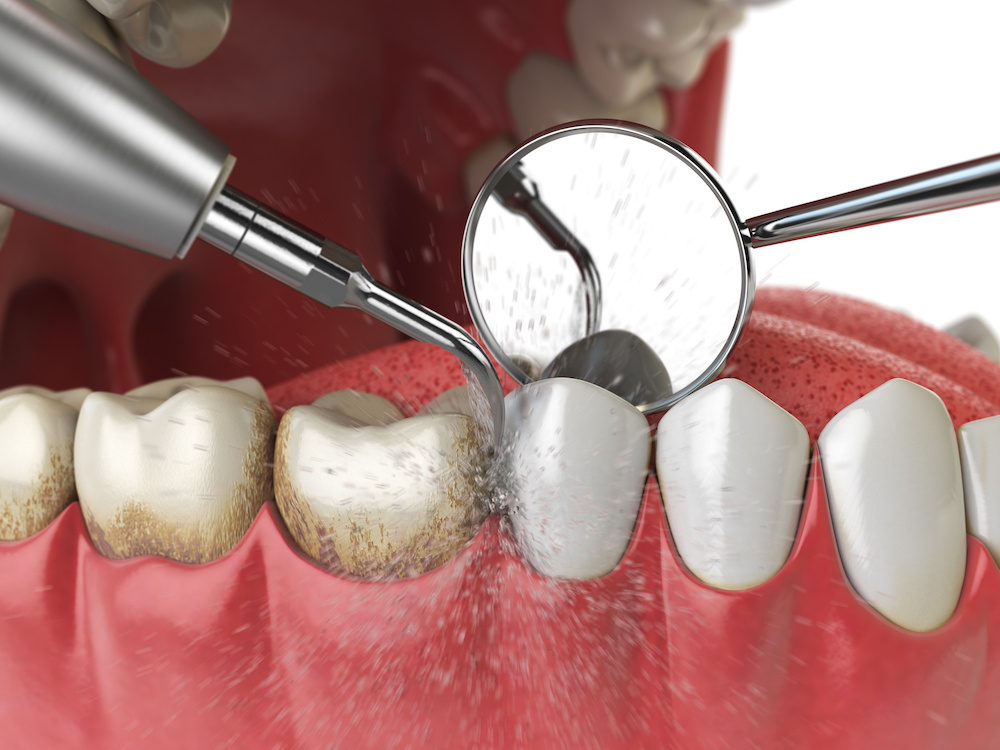Teeth cleanings are among the most important preventive dentistry treatments. There are two different types of teeth cleaning. Each is appropriate in different situations. Depending on your individual dental needs, you may need deep teeth cleaning in addition to your routine teeth cleaning appointment.
What Is Regular Teeth Cleaning?
Regular teeth cleaning is the procedure your dentist carries out every time you come in for a routine appointment. In general, patients should visit their dentist every six months for an examination and regular cleaning. These routine appointments help prevent a variety of dental issues and detect problems as quickly as possible.
The primary purpose of routine cleaning is to remove plaque and tartar from your teeth in order to prevent tooth decay and gum disease. Both of these common issues are caused by bacteria in your mouth that consume sugar and produce harmful acid.
Everybody has bacteria in their mouth. Managing the growth of that bacteria is key to maintaining oral health. Your brushing and flossing routine is a key part of this, as it helps remove excess bacteria from your teeth and around your gums. However, this isn’t enough for complete protection.
Bacteria can form deposits called plaque, which can harden to form tartar. These deposits can’t be removed by regular brushing. That’s why routine cleanings are necessary. The dentist uses scraping tools to remove plaque and tartar that brushing can’t. This way, you’re covered on all fronts when it comes to dealing with bacteria.
When Is Deep Teeth Cleaning Necessary?
Deep cleaning is similar in some ways to routine cleaning. Its main purpose is to remove harmful bacteria. However, a deep dental cleaning targets bacteria that have managed to penetrate below the gumline. Routine cleaning doesn’t reach these areas, so additional methods are required.
Gum disease is the result of bacteria reaching below the gum line and continuing to grow and multiply there. This begins with the first stage, gingivitis. At this point, you might notice bad breath and swollen gums, but not any severe symptoms. If gum disease is allowed to progress, it can lead to consequences like tooth loss.
Dental deep cleaning is only required once the symptoms of gum disease become apparent. It isn’t a general preventive treatment; instead, it treats the early stages of gum disease once they develop.
How Is Deep Teeth Cleaning Done?
Deep teeth cleaning combines two procedures to deliver the best possible results. During your deep teeth cleaning, your dentist will carry out both scaling and root planning. These two procedures deal with current bacteria accumulation and prevent bacteria growth in the future.
Scaling is similar to routine teeth cleaning, except special tools are used to reach deeper.
As gum disease progresses, it causes pockets to form around the teeth. Your dentist will use very thin tools to reach inside these pockets and scrape plaque and tartar from the teeth. The process is similar to how routine teeth cleaning addresses the visible surface of the teeth.
Once the scaling is complete, your dentist will carry out root planing. They will use a different tool to smooth the surface of the teeth below the gumline. By smoothing the surface, your dentist makes it more difficult for bacteria to take hold and grow there. Root planing can also help your gums reattach to your teeth.
Together, these two treatments are highly effective in dealing with early gum disease. More advanced gum disease can require additional procedures, such as flap surgery, to reach bacteria even deeper below the gums.
How Can I Prevent Gum Disease After Deep Cleaning?
After your deep cleaning, you should take measures to prevent gum disease in the future. One of the most simple steps you can take is to practice good oral hygiene. Following a simple brushing and flossing routine can greatly reduce your risk of gum disease.
Visiting your dentist for routine teeth cleanings every six months is also important. These cleanings can deal with plaque and tartar before they’re able to spread below the gum line to cause gum disease.
Including mouthwash in your oral health routine can also have great benefits. Mouthwash can reduce the number of bacteria in your mouth while also removing the remaining food particles that they feed on.
Schedule an Appointment For Dental Cleanings Today
If you’re experiencing symptoms like swollen gums or pain when chewing, reach out to Dental Implant & Aesthetic Specialists to find out more about your treatment options. Dr. Brett Langston provides routine dental cleanings and exams, deep cleanings, and a wide range of other dental services. Just contact us today to schedule your appointment.

